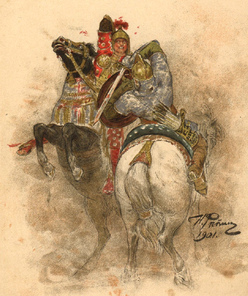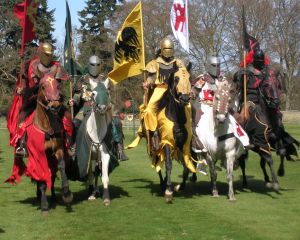The Appeal Of Fantasy For Young Adults
Kids go to fantasy not for escape but for organization, and a little elevation.
So says Adam Gopnik in his 2011 The New Yorker article, “The Dragon’s Egg.”
With the apparent resurgence of traditional, epic fantasy just around the corner, I suspect some may once again wonder what it is youth in particular see in these mythical tales. From “The Dragon’s Egg”:
Of all the unexpected things in contemporary literature, this is among the oddest: that kids have an inordinate appetite for very long, very tricky, very strange books about places that don’t exist, fights that never happened, all set against the sort of medieval background that Mark Twain thought he had discredited with “A Connecticut Yankee in King Arthur’s Court.”
So why does fantasy resonate with young adults? I can identify several reasons, some gleaned from “The Dragon’s Egg,” others from my own study and observation.
 First, I suggest today’s teens, expected to do little more than have a good time and do their homework, long for significance. They want to do something that matters, that has eternal purpose. The idea of moving from keg parties to paying taxes leaves out “making a difference.” They long for a life that matters, and they find in fantasy a world that needs someone who will step up and do just that.
First, I suggest today’s teens, expected to do little more than have a good time and do their homework, long for significance. They want to do something that matters, that has eternal purpose. The idea of moving from keg parties to paying taxes leaves out “making a difference.” They long for a life that matters, and they find in fantasy a world that needs someone who will step up and do just that.
Young adults also long for power. So often restricted by their circumstances and inabilities, they nevertheless long for the time when they can drive or vote or drink or . . . whatever the grown up thing is that indicates they now have a say about their own lives. Fantasy opens that door regardless of their actual present circumstances.
Then too, fantasy helps young people organize the world. There is moral right and wrong, and the characters in fantasy must align themselves with one or the other. There’s also history that makes a difference in the here and now, prophesy that tells about the future, and decisions that make or break a destiny.
In addition, fantasy offers “familiar experience in intensified form”:
We all see our lives from the inside to be those of lost kings, orphaned boys. We read such stories because we think we already are it. (excerpt from “The Dragon’s Egg”)
In short, fantasy shows young adults their inner lives. They read about Harry Potter’s unfair treatment at the hand of his foster family, and they identify with his alone-ness. They want him to find a place where he belongs because they want to find a place where they belong.
So too, with the the Twilight books by Stephenie Meyer:
The tedious normalcy of the “Twilight” books is what gives them their shiver; this is not so much the life that a teen-age girl would wish to have but the one that she already has, rearranged with heightened symbols. Your life could be like this; seen properly, from inside, it is like this. (excerpt from “The Dragon’s Egg”)
Another reason fantasy appeals to young adult readers is because it includes magic–a non-rational element that explains the inexplicable, that gives reason to hope in the face of the hopeless, that also explains the fearful in terms that are understandable, that suggest the terrifying is conquerable.
 In conjunction with magic, fantasy takes readers to another place–one that is both recognizable and other. The world itself, whether Narnia or Hogwarts or Middle Earth, is appealing. It has secrets–whether a secret entrance or hidden secrets or a world of secrets outside the view of the ordinary Hobbit. This resonates with young readers who hope for more from the mundane world in which they live.
In conjunction with magic, fantasy takes readers to another place–one that is both recognizable and other. The world itself, whether Narnia or Hogwarts or Middle Earth, is appealing. It has secrets–whether a secret entrance or hidden secrets or a world of secrets outside the view of the ordinary Hobbit. This resonates with young readers who hope for more from the mundane world in which they live.
Finally, fantasy most often suggests a Savior. There is someone stronger, better, wiser who will walk through the world with the hero, equipping him, counseling him, even sacrificing for him. To have such a Friend is the desire of every young person, assuring him that he does not have to traverse the journey and face the ordeals alone.
Now the question is, why does fantasy appeal so much to adults?
It’s your turn to weigh in. Are there factors that I’ve overlooked which make fantasy attractive to young adults? Are adults drawn to fantasy for the very same reasons as young adults are? Or for something different? What do you think?













































I don’t know about adults, since I’m not one. But I think you’re pretty spot on for why young adults like it, even though I’m more of a science-fiction fan.
But, perhaps since space opera is my favorite, they’re essentially the same.
Kaleb, I agree with your perspective on space opera. I’m not a big sci fi reader, but I do enjoy space opera. I hadn’t thought prior to your comment about the similarity with fantasy, but it’s there, no doubt.
Thanks for weighing in on the basic issue of YA and fantasy. Glad to know that you think these points are valid.
Becky
You’re welcome.
I read a lot more than space opera though in sci-fi though. I may have to think some more on it.
I see space opera as being fantasy in a space setting, or maybe a high-tech fairy tale. When I was a kid, I couldn’t get enough fairy tales. I still remember (and I hate to tell you how many years ago it was) when my 1st grade teacher read to us from a book of Chinese fairy tales. You know it made a strong impression, or I wouldn’t remember it a half century later (oops, I spilled the beans…)!
Yvonne, you must be on cloud nine with the resurgence of fairytales. 😀
I have a bad memory for the books I loved as a kid. I just know when I received a book as a gift and it was about ordinary people, I dismissed it as boring! I discovered mystery, though, and that sidetracked me from fantasy for a time, but once I found it as an adult, I was home!
Becky
Or fantasy might be like space opera in the past. Modern science fiction is older than modern fantasy.
I love this, and I think you are dead-on with your statement about youth wanting to feel like they are doing something worthwhile. I don’t think it’s just youth, either. I think we all want significance and purpose. The opening of my query letter for my YA fantasy included this line: “… people love going on a ride with someone who finds herself in the middle of another world…and really important to that world.”
To me, fantasy has always meant finding my place, somewhere I can be part of a world that is as strange as I am :). Fantasy is a place where the misfits fit in because of their uniqueness rather than despite it.
I’m an adult who reads mostly YA, and my reasons haven’t changed since I was a kid. I love the idea of magic and mythical creatures, of exploring a world so different from mine and a place where different is appreciated, and of riding along side a character who becomes really important for who they are. Oh, and dragons are just freaking cool :).
Kat, I’m with you. I think adults want to make a difference, too. That’s why you hear so much about “legacy” these days. As the baby-boomer generation grows older, suddenly there’s an awareness that their lives out to matter for something.
I also find that I have some of the same delights I had as a young reader. I loved secret places and secret identities and secret powers–speculative elements, though I didn’t know it at the time. I don’t think we have to “out grow” those things. Seems silly to me, as if we should outgrow liking ice cream or M&Ms or french fries. Why would we? Can’t we add new foods whose tastes we’ve acquired without dropping the ones we’ve enjoyed over time? I think yes, absolutedly! 😀
Becky
Oh, great point about the secret places! Yes, that is another thing that appeals to me. It’s like, even though the story is read by thousands or even millions of people, when I’m reading it’s a place I’ve discovered, a secret place, all my own. And I was one of those kids that pretended there was a hidden trap door that led out of my bedroom and pretended my hallway was a secret passage in a medieval castle…
I love your point about organizing the world. I’d add to that the idea that we can always close a book and walk away from a chaos we can’t control–we can come back to it later, when we’re read–something we often can’t do in real life.
Thanks, Shannon. I’d love to take credit for that one, but it’s actually a point Adam Gopnik made in his article. It resonated with me, though.
I like your add. Being able to put away the conflict or chaos is liberating, though I tend to gravitate toward books that help make sense of that, so I usually want to keep reading.
Becky
I’ll be 20 this year, so adult? Young adult? Not really sure which I am. (Hmm, guess I need to find where I belong there!) It probably depends on your definition of “adult”. 🙂
But I love fantasy because of its beauty, its wondrous places and sights (like the picture on the cover of Words Unseen…that gives me solemn and yet joyful thrills). I love reading about strange new worlds and finding new heroes and favorite characters. Also in fantasy, you can strip away all disguises, all verbal justifications (“it’s not abortion, it’s choice“) and show the black and white of an issue. You can do that with other genres too, but somehow, the towel rack looks different when seen in the mirror than when you’re looking straight at it. Especially if you’ve been looking at the rack so long that you hardly see it anymore.
I also love fantasy for it’s potential…you can use a mirror to show someone truth or to feed that seven-years-bad-luck superstition.
This was an interesting article, Becky,; thanks for posting it! Now I’m curious: what attracts you to fantasy? (Or maybe you were going to cover that next week.)
Looking forward to your next article!
Blessings,
Literaturelady
Heh heh heh, that YA label is ambiguous, I think. To me, it’s 18 to 25 or so, but in the publishing world, I think it is 14 to 18.
I love your reasons for loving fantasy. I think the one that resonates with me most is looking at the towel rack in the mirror, especially because I may have become so used to the towel rack, I no longer noticed it in real life.
I love fantasy, though, primarily because of the way the spiritual can come alive. One of the books that utterly changed me was The Great Divorce. In that book C.S. Lewis showed me a glimpse of heaven like I’d never seen before. And I needed to see it. In Til We Have Faces, he showed me God’s great forgiveness and transforming power.
I don’t think all fantasies do as much as Lewis’s, but I’m always on the look out. 😉
Becky
Well written, and spot on.
Adults like fantasy for the same reasons. There are adults (and YAs) who despise fantasy, or, of course, think it’s evil by definition.
Yes, space opera has much the same appeal, I guess, but the magic is more explicit in fantasy.
The reasons you give don’t all apply to “The Lord of the Rings,” I think, in particular, it doesn’t say a lot about inner lives and ordinary existence, whereas the “Harry Potter” books, for one example, do.
Martin, good point about sci fi not including the magic elements. Rather they use the techie elements. 🙂 Although, C. S. Lewis’s space trilogy had as much or more magic as tech, I think. But he’s an exception.
I agree that LotR didn’t deal with the inner life as much as other fantasy, but I think it still did. Frodo was tempted to keep the ring and was burdened by it. Whether or not Tolkien intended it, Frodo’s bearing it, certainly gave me a visual of sin like I’d never had before.
Ah, yes, there are the despisers. Sigh!
Becky
Maybe I’m the oddball, but I mostly do read fantasy as escapism. I tend not to over-think everything or metaphorize events in books. (Your comparison of carrying the Ring to struggling with sin, for instance, would never have consciously come to my mind.)
What draws me to fantasy is the emotion, mostly. The struggle and the conflict and the setback and the victory. It puts me in a world where the conflicts are concrete, and have an ending. Like the G.K. Chesterton quote says, “Fairy tales are more than true; not because they tell us that dragons exist, but because they tell us that dragons can be beaten.” I mostly read because they give me a break from the “incessant conflict with only degrees of success” feeling that life can give me. The heroes’ successes remind me that dragons can be beaten.
In line with that, I actually think that fantasy’s attractor, Gopnik’s opinion notwithstanding, is that it is different from real world. The ‘similarity’ attraction is illogical – otherwise we would just read fiction set in the real world. So why fantasy (or sci-fi, for that matter)? Because it’s different. It lets us get away from life… and in so doing energizes us to face life once more. Like a breath of fresh air, reminding us that we’re in part of the Ultimate Story and that in the end, the Hero will have (and has had) His victory.
Agreeing, Becky, with your assertion that it “helps young people organize the world”…
Fantasy is where the battle between Good vs. Evil seems to have made its home without protest from atheists. Evil doesn’t have the final word. Hope conquers cynicism. Miracles are possible (magic). It’s a roman à clef for the spiritual realm!
Good stuff!
Betty Ann
BTW, this is not fantasy per se (although aren’t most spy stories fantastical?), but speaking of a roman à clef for the spiritual realm…
DANGER MAN: Bury the Dead
When I first saw this episode of Danger Man years ago, the scene that runs from 14:40 to 17:50 made me think that the reason why we are supposed to turn the other cheek is because Satan is trying to get our minds of the real battle and get us to take things personally.
I would really love to have some feedback on this. So far, I haven’t been able to get anyone to watch it and talk to me about it. If you have time, please watch the whole thing. The set up will be better!
I imagine the bad guys in this story to be stand-ins for Screwtape, Wormwood, and the Evil One himself, à la The Screwtape Letters.
Betty Ann
[…] recently blogged concerning “The Appeal Of Fantasy For Young Adults.” My intention in this article is to simply offer the contrary in question form. Why aren’t adults […]
I had a great quote for fantasy/scifi, but I’ll save it for the part about “proper” adults. As for myself, I started on fantasy with Chronicles of Narnia and didn’t add much scifi until college.
Glad you’re back, Galadriel. 😀
Becky